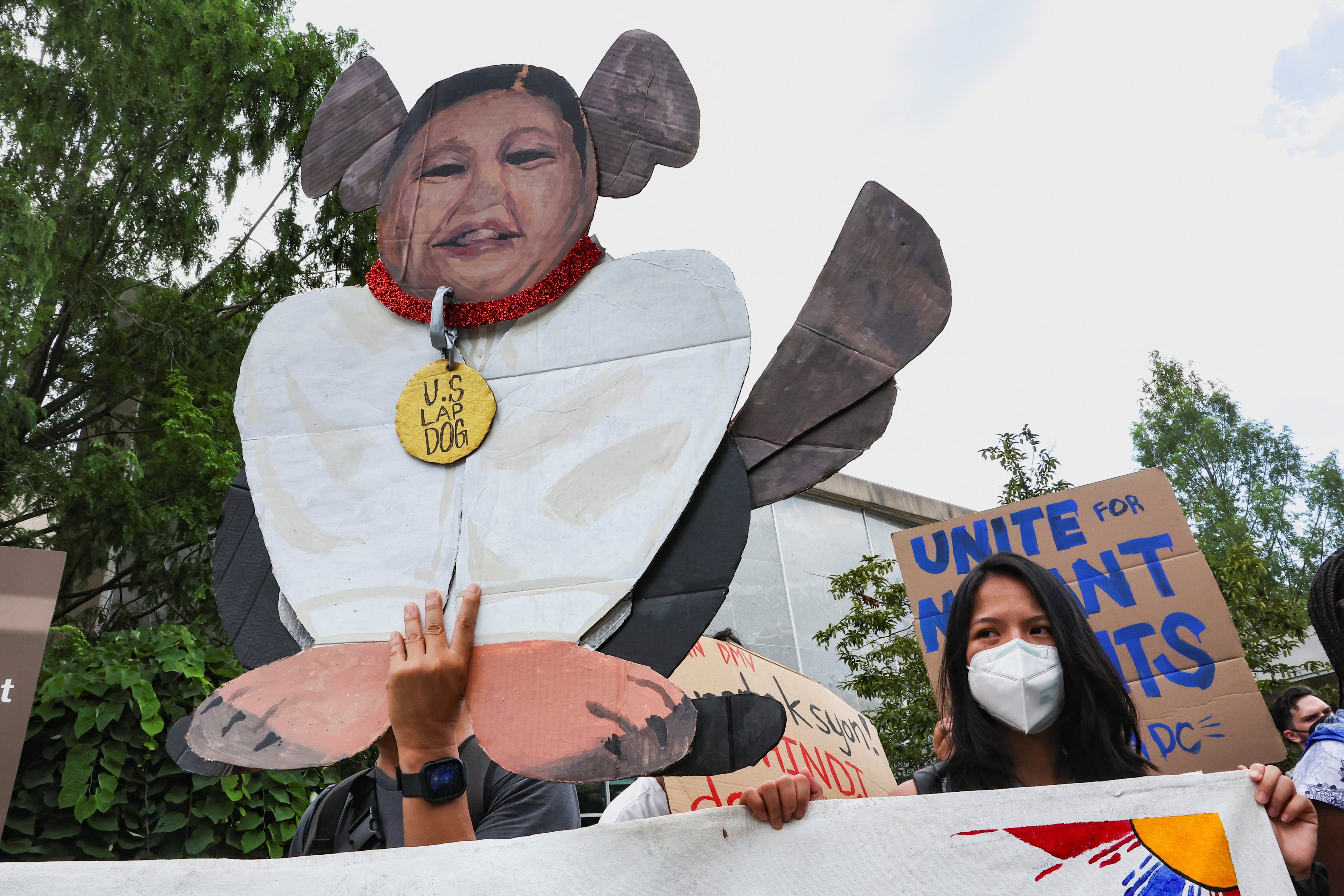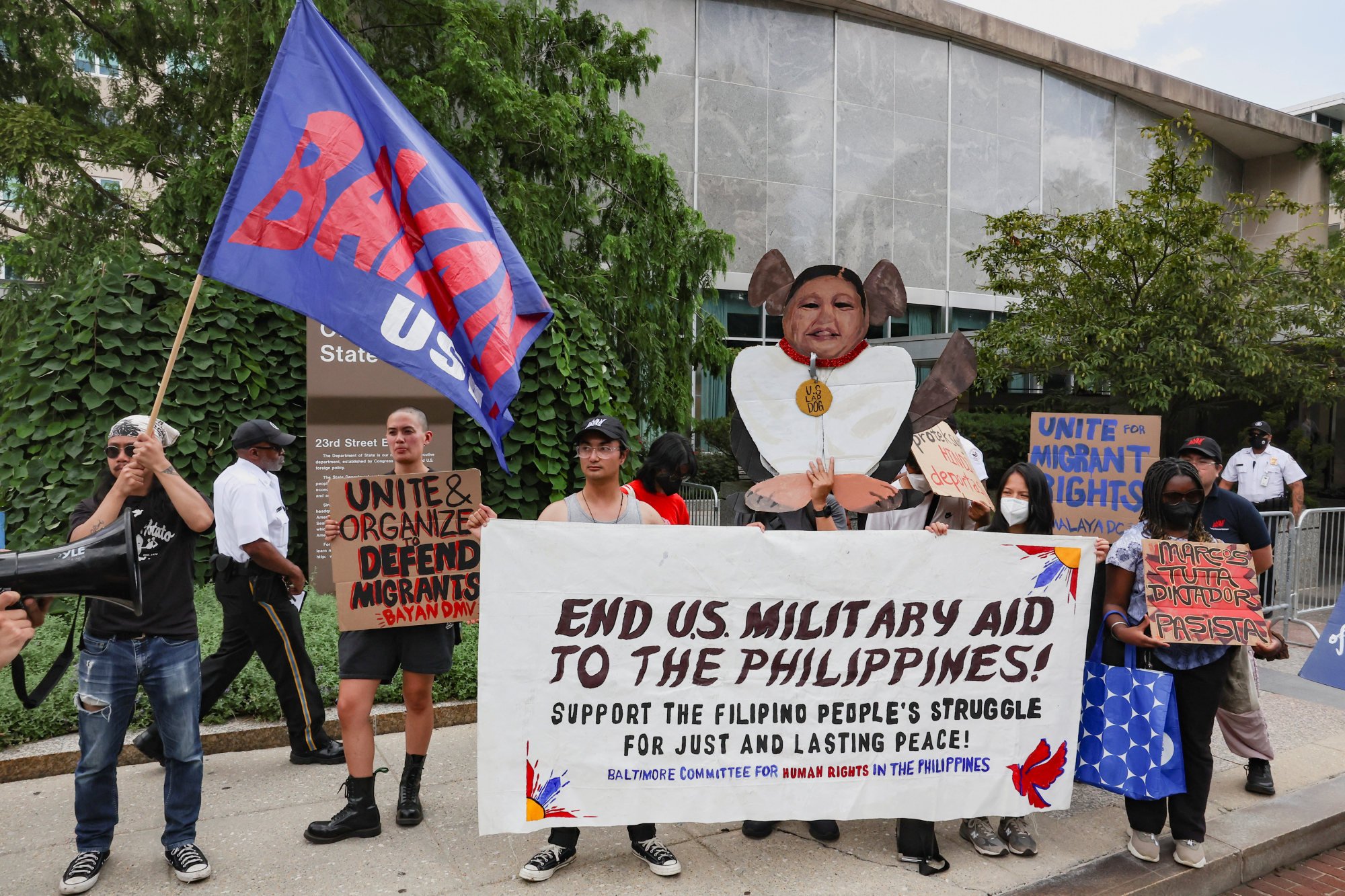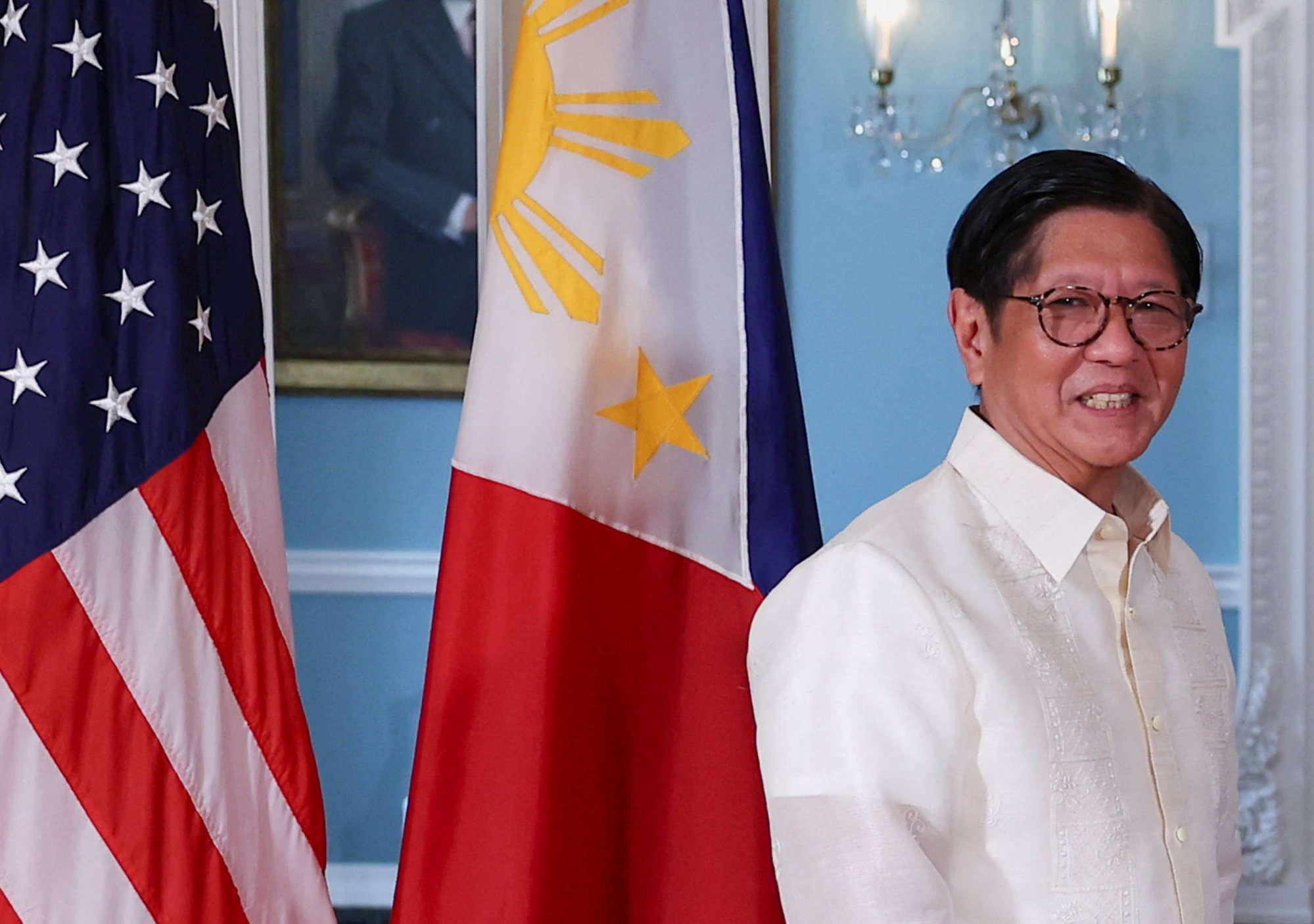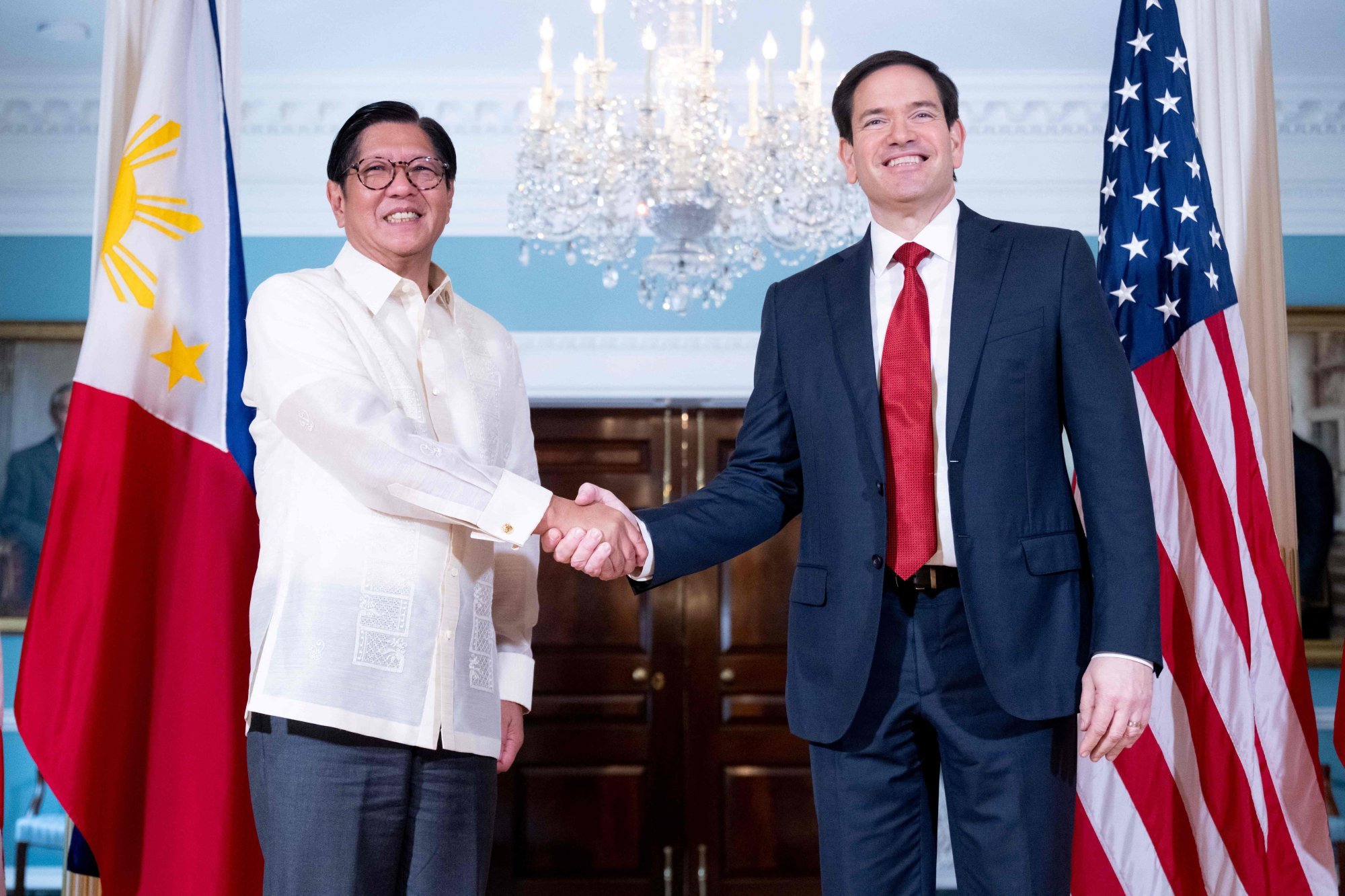Marcos’ ‘inexcusable’ snub of Filipino-American community widens disconnect
Protesters accuse Philippine leader of failing to meet community and ignoring urgent immigration issues concerning Filipino workers in the US

Philippine President Ferdinand Marcos Jnr is facing a wave of criticism from migrant advocates and Filipino-Americans over what they see as his failure to defend overseas workers caught in the widening immigration crackdown by US President Donald Trump’s administration.
Marcos is in Washington for a three-day state visit culminating in high-stakes trade and security talks with Trump on Tuesday. He and his entourage were met by more than 100 protesters on Sunday and Monday, gathered outside both the White House and Blair House, where the Philippine delegation has been staying.
Demonstrators accused the president of ignoring urgent immigration issues, including raids, detentions and deportations of Filipino workers, while making time to court US defence officials and business leaders.
“It is inexcusable that he would not make time to visit his own citizens while we are faced with immigration crackdowns, rights violations in detention centres, looming taxes on remittances and many more attacks on migrant communities under the Trump presidency,” Andan Bagoyo, chairman of Bayan USA, a progressive alliance of Filipino organisations, told This Week in Asia.
The United States is home to the world’s largest Filipino diaspora, with 4.1 million people of Filipino descent as of 2022. Nearly half are immigrants. But no meetings with community representatives have been scheduled during Marcos’ visit, which began on Sunday.
According to Philippine foreign affairs officials, the president’s itinerary simply did not allow for it, as “it’s a very short visit”.

Migrant groups say the snub comes at a time of heightened vulnerability for Filipinos working in the US.
Between April and July, 21 Filipino crew members were removed from a Carnival Sunshine cruise ship following raids by US Customs and Border Protection officers. Some were deported and banned from re-entering the country for 10 years, despite holding valid 10-year work visas, according to the Pilipino Workers Centre.
Cruise employees alleged that they were placed in handcuffs and accused of possessing child pornography by officers, despite being unable to provide evidence.
“There were no formal charges at all. Only accusations with no evidence,” Pilipino Workers Centre Executive Director Aquilina Soriano Versoza told The Virginian Pilot.
Earlier this month, 42-year-old green card holder Max Londonio was released after having been detained at an Immigration and Customs Enforcement (ICE) detention centre since May.
Unhandled type: inline-plus-widget {“type”:”inline-plus-widget”}
He had reportedly spent nearly a month in solitary confinement in what labour advocacy group Tanggol Migrante Network said was “retaliation” for exposing inhumane conditions at the centre and fighting for the rights of fellow detainees.
Londonio was detained by ICE officers after returning home to Washington following a family trip to the Philippines.
A US immigration judge in late May ordered the release of 64-year-old Philippine-born green card holder Lewelyn Dixon, who spent three months at an ICE detention centre in Tacoma, Washington after being detained on February 28. Dixon too was returning to her home in Seattle after a trip to the Philippines.
An immigration judge in Tacoma later ruled that a two-decade-old conviction for embezzlement could not be used as a basis for Dixon’s deportation to the Philippines.

Question of priorities
Bagoyo slammed Marcos for making time to meet US corporations and negotiate business and military deals “but could not even spare one hour to speak with Filipino migrant workers and the community” during this critical time.
“He has remained essentially silent on these issues from the start,” he said. “It really does show where his priorities lie: in maintaining his relationships with the US even if it comes at the expense or neglect of our own nationals.”
Jom Dolor, deputy secretary general of Migrante USA, said it was “insulting” that Marcos would use his diplomatic platform to pursue trade and military deals, “but refuses to use it to protect us against these attacks”.
“Our people are getting disappeared and detained, and yet [Philippine officials] claim that the president has ‘no time’ to discuss the matter with Trump nor face the community to hear out our concerns,” Dolor said.
According to Bagoyo, officials from the Philippine embassy in Washington had refused to meet their group, as well as the families of Filipinos released from and currently detained at ICE detention centres.
“If Marcos was a president who truly represented the interests of the everyday Filipino, he would have stood up to bullies like Trump and his cabinet,” Bagoyo said.
“He would have asserted measures to protect local industry and agriculture as safeguards to the fickle and retaliatory tariff games Trump is playing. He would have prioritised asserting the well-being of Filipino nationals living in fear and living in detention as a result of Trump’s policies. But we know that is not the kind of leader Marcos is.”

Bagoyo urged Marcos to meet Filipinos detained by ICE and their families, as well as concern groups, to “acknowledge the trauma they endured” because of the Philippine government’s lack of intervention.
He also called on the president to “stand against Trump’s attacks on migrant communities”. Marcos should ensure immediate and adequate assistance for Filipinos in detention and for those already deported, and secure commitment from the US government that no Filipino would be deported to a third country, Bagoyo added.
Among the key agenda items on Marcos’ Washington trip is Trump’s imposition of tariffs on Philippine exports – raised to 20 per cent from 17 per cent in April – a move that has rattled Manila’s economic planners.
Marcos met US Secretary of State Marco Rubio on Monday, with the two reaffirming the countries’ “ironclad alliance” and commitment to maintaining peace and freedom of navigation in the Indo-Pacific, according to a US State Department readout.
US Defence Secretary Pete Hegseth also received Marcos at the Pentagon the same day, where they pledged to deepen defence ties under the 1951 Mutual Defence Treaty and discussed regional security developments.
But for Bagoyo and other protesters, the visit has only widened the disconnect between Marcos and overseas Filipinos. He said he and other protesters would return to the streets of Washington “to confront him one last time” before Marcos’ meeting with Trump.